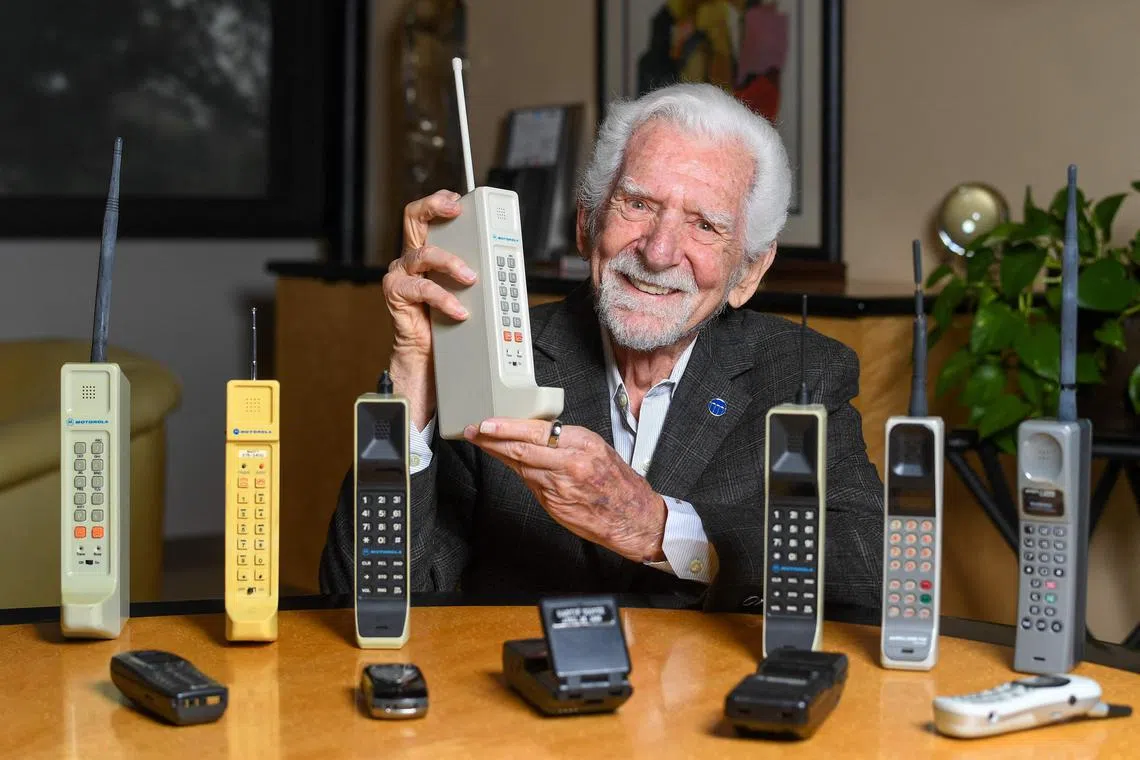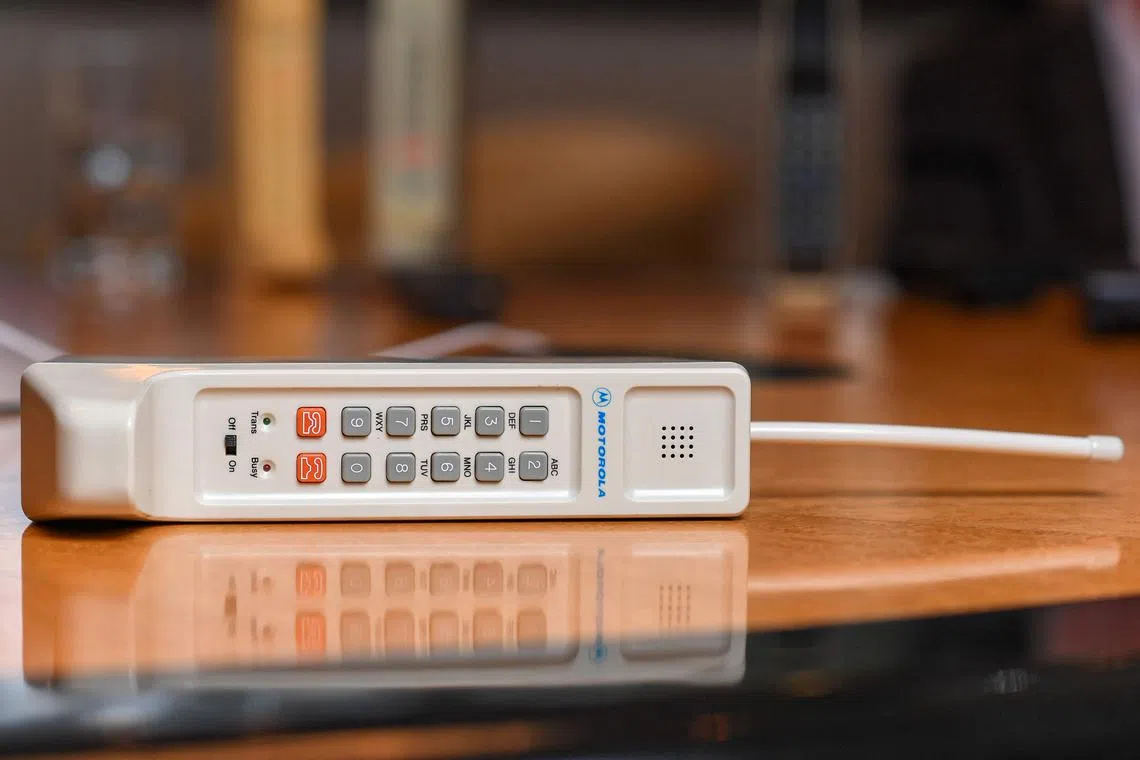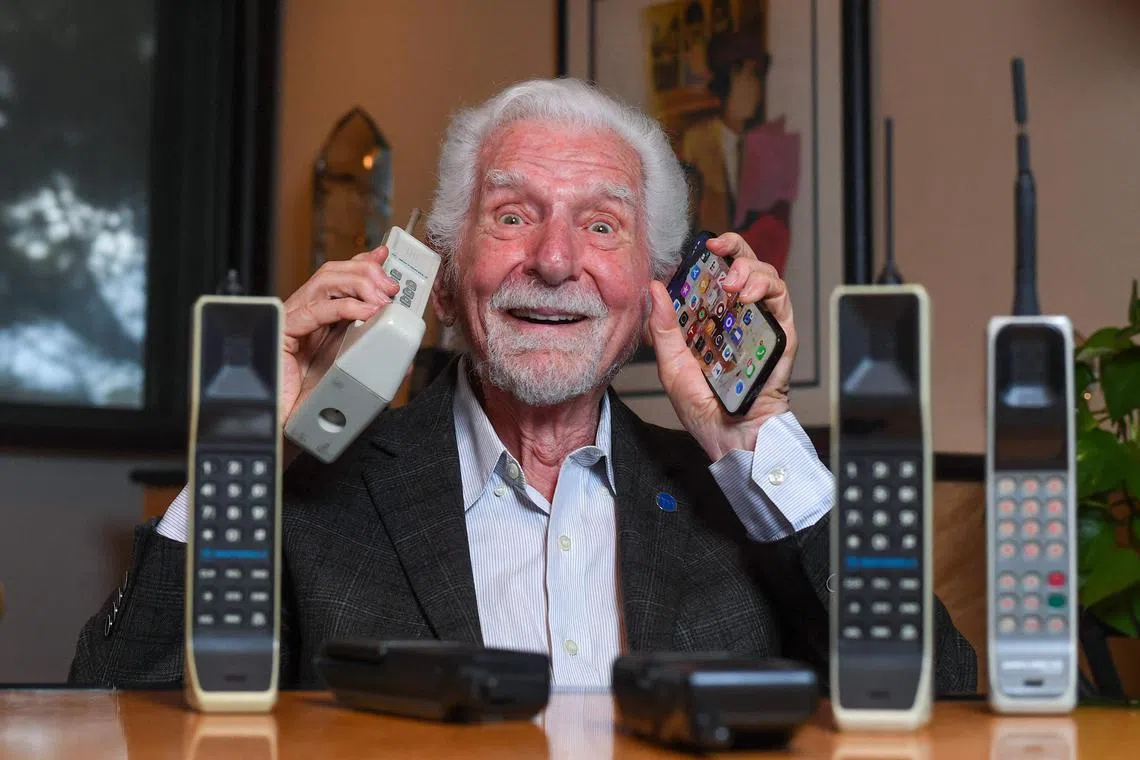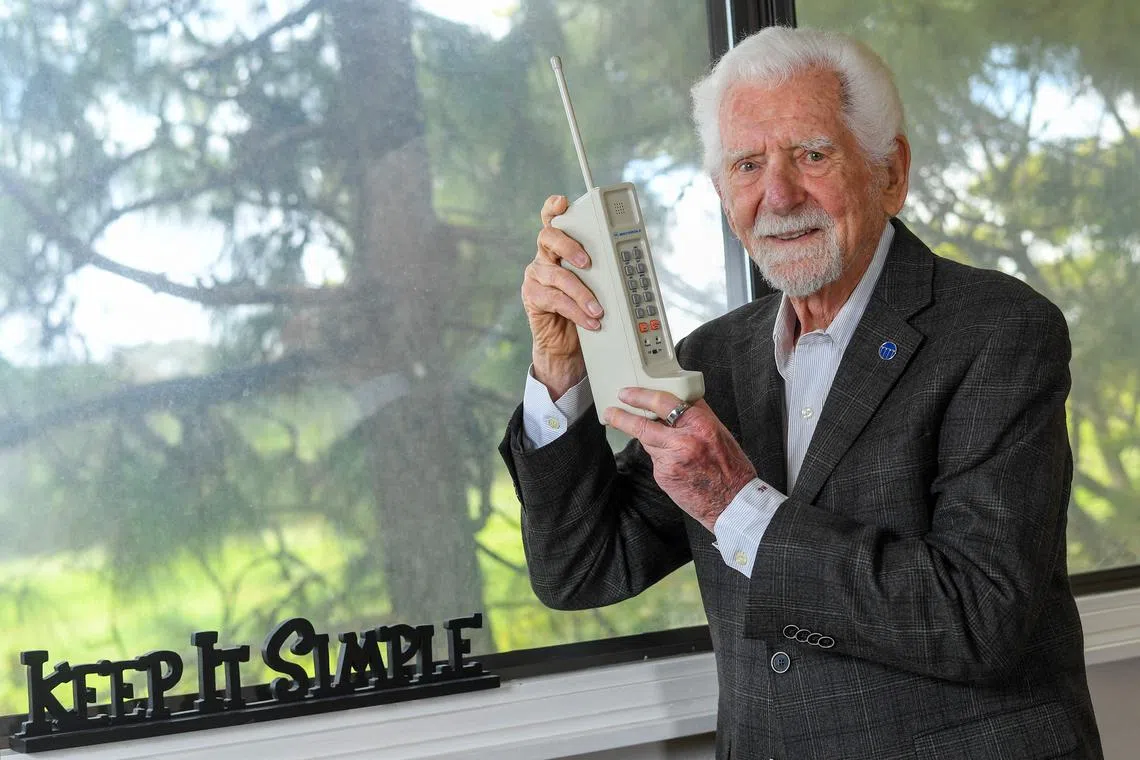Take your eyes off your mobile phone, says inventor, 50 years on
Sign up now: Get ST's newsletters delivered to your inbox

American engineer Martin Cooper says the neat little device we all have in our pockets could one day help conquer disease.
PHOTO: AFP
DEL MAR, California - The problem with mobile phones is that people look at them too much. At least, that is according to the man who invented them 50 years ago.
Mr Martin Cooper, an American engineer dubbed the “father of the cellphone”, said the neat little device people all have in their pockets has almost boundless potential and could one day even help conquer disease.
But right now, people can be a little obsessed with it.
“I am devastated when I see somebody crossing the street and looking at their cellphone. They are out of their minds,” the 94-year-old said from his office in Del Mar, California.
“But after a few people get run over by cars, they’ll figure it out,” he joked.
Mr Cooper wears an Apple Watch and uses a top-end iPhone, flicking intuitively between his e-mail, photos, YouTube and the controls for his hearing aid.
He gets his hands on the latest model every time it is updated, and gives it a thorough road test.
But, he confessed, with several million apps available, it can all feel a bit much.
“I will never, ever understand how to use the cellphone the way my grandchildren and great-grandchildren do,” he said.
Real mobility
Mr Cooper’s iPhone – which he said he likes to use mostly to speak to people – is certainly a very long way from the weighty block of wires and circuits that he used to make the very first mobile phone call on April 3, 1973.
At the time, he was working for Motorola, leading a team of designers and engineers who were engaged in a sprint to come up with the first properly mobile technology and avoid being squeezed out of an up-and-coming market.
The company had invested millions of dollars in the project, hoping to beat out Bell System, a behemoth that dominated US telecoms for more than a century from its inception in 1877.

A contemporary copy of the original cellphone that engineer Martin Cooper used to make the first mobile call on April 3, 1973.
PHOTO: AFP
Bell’s engineers had floated the idea of a cellular phone system just after World War II, and by the late 1960s had taken it as far as putting phones in cars – partially because of the huge battery they needed.
But for Mr Cooper, that did not represent real mobility.
At the tail end of 1972, he decided he wanted a device that you could use anywhere.
So with the entire resources of Motorola at his disposal, he pulled together experts on semiconductors, transistors, filters and antennae, who worked around the clock for three months.
By the end of March, they had cracked it, unveiling the DynaTAC – Dynamic Adaptive Total Area Coverage – phone.
“This phone weighed over a kilo and had a battery life of roughly 25 minutes of talking,” he said.
“That was not a problem. This phone was so heavy, you couldn’t hold it up for 25 minutes.”
That very first phone call did not have to be long. It just had to work.
And who better for Mr Cooper to call than his rival?
He recalled: “So here I am standing on Sixth Avenue (in New York). And it occurred to me, I had to call my counterpart at the Bell System... Dr Joel Engel. And I said, ‘Joel, this is Martin Cooper... I’m talking to you on a handheld cellphone. But a real cellphone, personal, portable, handheld.’
“There was silence on the other end of the line. I think he was gritting his teeth.”
Conquer disease

Mr Cooper’s iPhone is a very long way from the block of wires and circuits that he used to make the very first mobile phone call.
PHOTO: AFP
Those first mobile phones were not cheap at around US$5,000 a handset, but they gave an edge to early adopters, whom Mr Cooper said included people trying to sell property.
“It turns out that what real estate people do is they show people houses, or they answer the phone for new clients.
“Now they could do both at the same time; it doubled their productivity.”
And mobile phones continue to improve people’s lives.
“The cellphone has now become an extension of the person. It can do so many more things... and in that regard, we are just at the very beginning.
“We’re just starting to understand what that could do,” he said.
“In the future, we can expect the cellphone to revolutionise education; it will revolutionise healthcare.
“I know that sounds like an exaggeration, but I want you to know within a generation or two, we are going to conquer disease.”

Mr Cooper always knew the device he and his team came up with would change the world.
PHOTO: AFP
Just like his watch monitors his heart rate while he swims, and his phone monitors his hearing aids, phones will one day be connected to an array of bodily sensors that will catch illness before it develops, he said.
It is all a long way from where it started with that monster handset, but while he did not envisage every development, Mr Cooper always knew the device he and his team came up with would change the world.
“We really knew that everybody some day would have a cellphone. We’re almost there.
“There are more mobile phone subscriptions in the world today than there are people. So that part of our dream has come true.”
As for the problem of people gawping at their phones too much – even as they cross the road – he is not worried.
New technology often throws up challenges. “When television first came out, people were just hypnotised... but we somehow... managed to understand that there is a quality associated with looking at a television,” he said.
Right now, people are at the mindless staring phase with their phones, he said, but that will not last.
He said: “Each generation is going to be smarter... They will learn how to use the cellphone more effectively.
“Humans sooner or later figure it out.” AFP


